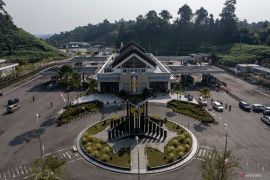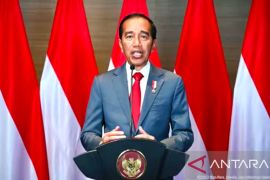....we must ensure that the connectivity project will not be misused by irresponsible people...."Bangkok (ANTARA News) - The development of infrastructure among ASEAN nations to support the organizations target for economic integration in 2015, along with the recently improved domestic situation in Myanmar, was highlighted during the 20th World Economic Forum (WEF) on East Asia held in Bangkok recently.
Many CEOs and leaders attending the Bangkok meeting emphasized the need for ASEAN members to speed up their development of infrastructures.
"ASEAN countries have now realized that they need infrastructure to develop the region`s economy. However, they cannot provide funding for such development alone. This is where investors take part. A good and transparent cooperation between the government and private parties to build ASEAN`s infrastructure is needed," Managing Director of Asian Development Bank (ADB) Rajat M Nag said.
He explained that although ASEAN`s economy is developing at the moment, the region is still haunted by the disparity among its members. He said people having limited access to infrastructure are one of the issues that cause such disparities, particularly economic disparity, in the region. Therefore, one of the keys to resolve these problems is the development of infrastructure.
"Infrastructure can reduce the deficit of inequality in the region," he added.
As to the private sector, he said, the challenge to build infrastructure in ASEAN is caused by the high cost of feasibility studies prior to the start of construction.
Heidi Crebo-Rediker, Chief Economist from the US Department of State, said investors from her country are very interested in investing in ASEAN. However, she reminded governments in the region to set up a more transparent system for public-private cooperation in developing infrastructure among ASEAN nations.
Meanwhile, observers from the United States` Cornell University, Aswar Prasad, said corruption and economic inequality that besets ASEAN countries could hamper the organisation`s goal to increase connectivity between its people.
"As long as corruption and economic inequality exists, the people of ASEAN will think that integration will only benefit certain groups of people," he explained.
Responding to Prasad`s statement, Indonesian Trade Minister Gita Wirjawan - who also attended the forum - confirmed that Indonesia is on its way to fully eradicating corruption and minimising the economic gap between its people.
"With an increasing population, Indonesia is all set for growth - if it can fix its corruption. In terms of economic inequality, Indonesia, during the past two years, has been trying to reach the MDG target, while also improving the economic conditions of people living outside Java Island," he added.
Meanwhile, Thailand`s Deputy Prime Minister and Minister of Finance, Kittiratt Na-Ranong, said that in order to achieve the target of ASEAN connectivity by 2015, all ASEAN member countries must first tackle their domestic problems.
"For example, each country must increase its people`s purchasing power in order to boost the economic integration of ASEAN," he remarked.
Earlier, during the opening ceremony of the Bangkok meeting, President Susilo Bambang Yudhoyono stated that Indonesia is continuously improving its domestic connectivity to help achieve ASEAN`s connectivity target by 2015.
"We have a master plan to improve the domestic connectivity which, I hope, will contribute to the realization of ASEAN`s target for regional connectivity in 2015," said the president.
He expressed optimism that Indonesia will be able to improve its domestic connectivity as the country has enough human and natural resources, positive economic growth and growing purchasing power for the population.
Meanwhile, Lao Prime Minister Thongsing Thammavong, who also attended the forum, said his country is ready to support ASEAN`s target of connectivity by 2015.
"We are aware of the importance of ASEAN connectivity to eradicate poverty in our country. Currently, we have completed the construction of three Mekong bridges in our country and we have started the construction of a railway link connecting to Thailand. We are creating domestic policies that will turn this country from a closed nation to become the country that will connect the ASEAN region," he said.
Thai Prime Minister Yingluck Shinawatra, in her opening address to the forum, emphasized the need for ASEAN member countries and their partner countries to complete several connectivity-related projects, such as the Mekong River project, a train link connecting Singapore to Kunming (southwest China), as well as a high speed railway connecting Thailand, Laos and southern China.
"However, we must ensure that the connectivity project will not be misused by irresponsible people to commit crimes such as drug and human trafficking," she added.
Myanmar Issue
Apart from discussing ASEAN connectivity, The World Economic Forum held in Bangkok also highlighted recent positive events in Myanmar, which is scheduled to take over as chairman of ASEAN in 2014, one year before the region`s connectivity target is to be reached.
Myanmar`s opposition leader Aung San Suu Kyi, who attended the meeting two months after winning a seat in parliament, said Myanmar needs "human capacity building" to support its reformation agenda.
"Myanmar`s reformation, to me, means the improvement of people`s capacity. Currently, there is high unemployment, particularly among the young people in Myanmar. This can be a time bomb for the country," she stated.
Suu Kyi said Myanmar`s reformation agenda would be hampered if the country`s human resources were not prepared to implement it. She emphasised the need for local people to receive proper education to improve the quality of their lives. She further expressed hope that the international community would assist Myanmar in such efforts.
Suu Kyi's presence at the World Economic Forum in Bangkok marks her first overseas visit, after being arrested for 24 years, and also highlighted the need for women`s empowerment in ASEAN to be upgraded.
"It is possible for women to contribute to any sector. However, we haven`t been given the same chances as men in the region. This is more of a cultural problem in society, rather than an economic one," she pointed out.
Suu Kyi mentioned some methods to tackle the cultural problem of women`s empowerment in ASEAN regions, namely, to encourage women to assume leadership roles in political parties and to provide incentives to families to keep their girls in school.
Sharing the same view as Suu Kyi, President and Chief Executive Officer of the United States-based NGO CARE, Helene D. Gayle, cited numerous studies showing that empowering women can have a multiplier effect on the community - in terms of improved health, higher literacy rates and a reduction in extreme poverty - to a greater extent than can be achieved through other development initiatives.
Meanwhile, Myanmar`s Minister of Energy, U Than Htay, in his remarks during the closing ceremony of the forum, outlined the reform efforts of his country's government, noting that it is focusing on steps to guarantee the fundamental rights of citizens, bolster transparency and accountability, and improve infrastructure and education.
"These moves are going forward with the cooperation of all the stakeholders in the country. The government has made efforts to fulfill the wishes of the people to live in peace and stability," he added. (*)
Reporter: Amie Fenia Arimbi
Editor: Aditia Maruli Radja
Copyright © ANTARA 2012











